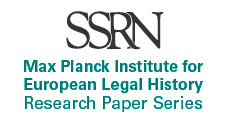(Source: rg.mpg.de)
The MPI for European Legal History
published the fourth issue of the sixth volume on its SSRN Research Paper
Series.
Paper
1
"Authorized
Interpreters of Islamic Law – The Shīʽa View",
Max Planck Institute for European Legal History Research Paper Series No.
2017-04
KATARIINA SIMONEN, University of Helsinki -
Faculty of Law
Email: katariina.simonen@helsinki.fi
English Abstract:
The question of who is authorized to interpret Islamic law is a difficult one due to the plurality of different schools of Islamic jurisprudence, each of which allocates the authority very differently. Yet, any dialogue in matters of Islamic law requires the correct interlocutors to be identified. This topic is as under-researched in Western legal and security-policy studies as it is important.This study attempts to identify the correct interlocutors in legal matters under Twelver Shīʽism, which is the state religion in Iran. In terms of its legal history, such authority has developed into a hierarchical, yet pluralistic system of legal authority since the end of the 18th century, with the victory of the so-called Ușūlī school of jurisprudence and the emergence of grand jurists (marājiʽ-i taqlīd). The process of designating absolute authority continues informally, but a key prerogative is superior knowledge of Islamic law and religion.Such grand jurists have, at times, exercised great influence over the ruling Shāhs. Other times, they have preferred to remain teachers in religious schools. An important change took place with the 1979 Islamic Revolution, through which the guardianship of the jurist (vilāyat-i faqīh) was crystallized in the Iranian constitution. Since then, grand jurists have had to accommodate another religious and political authority, the guardian jurist or supreme leader (valī-yi faqīh). To date, the division of authority between the guardian jurist and grand jurists remains unresolved. The future will depend on the strength of the requirements developed by the Ușūlī school regarding superiority in learning for any attribution of authority.
Paper
2
"Sagrada
Unción (DCH) (Holy Unction (DCH))", Max Planck
Institute for European Legal History Research Paper Series No. 2017-05
OSVALDO RODOLFO MOUTIN, Max Planck Society
for the Advancement of the Sciences - Max Planck Institute for European Legal
History
Email: ormoutin@gmail.com
English Abstract:
This article describes the general doctrine and liturgical practice regarding the sacraments, and concerning holy unction specifically, in the early modern Roman Catholic tradition and in the context of the Spanish Indies, according to canonical doctrine.
Paper
3
"Acusaciones
e Inquisiciones (DCH) (Accusations and Inquisitions (DCH))", Max Planck Institute for European Legal History Research Paper
Series No. 2017-06
ALEJANDRO AGUERO, CONICET-CIJS Universidad
Nacional de Córdoba
Email: aleaguero@hotmail.com
English Abstract:
The papers can be downloaded at SSRNConceived for the Historical Dictionary of Canon Law in Latin America and the Philippines (XVI-XVIII), this essay addresses the study of the terms "accusation" and "inquisition" within the framework of this legal tradition. The text analyzes the technical meaning of these terms in Canon Law as well as the semantic changes derived from the use and judicial practice, paying particular attention to the context of colonial canon law in the domains of the old Hispanic Monarchy.


No comments:
Post a Comment